Is football's racism battle being lost on social media?

Last updated on .From the section Football
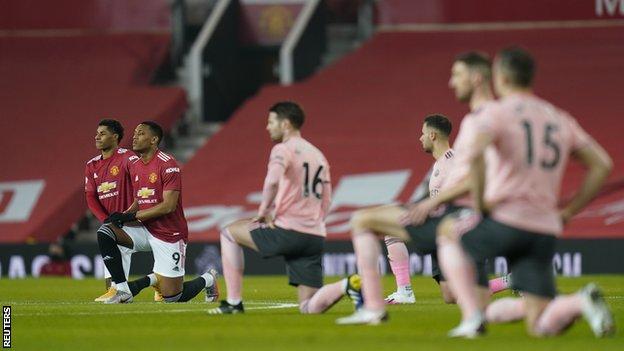
When it comes to online racist abuse, football appears to have had enough. Again.
Last week's series of incidents provoked a wave of condemnation from across the game and beyond.
And yet, this comes almost two years after top stars took part in a campaign called '#Enough', a 24-hour social media boycott in protest at a similar spate of abuse.
Now the same demands for tech platforms to do more are being made. So is the battle being lost? Why is it proving so difficult to tackle this issue? And where is this crisis heading?
- Duke of Cambridge calls for racist abuse of footballers to stop
- Chelsea 'disgusted' after Reece James racially abused on social media
- Arrest over racist abuse of West Brom player Sawyers
- Racist abuse sent to Manchester United pair Tuanzebe and Martial
Time to take responsibility
The pressure on the social media platforms is intensifying. The appetite for more regulation is growing.
Last week the Premier League said the tech companies "need to do more", calling for "swifter removal of offensive messages and improved identification and banning of offenders".
Manchester United, with three of their squad subject to vile messages, urged the creation of verifiable and identifiable accounts so offenders could be caught, saying they and the players were "sick of it", making the point that no one should face such hate-filled abuse in their place of work.
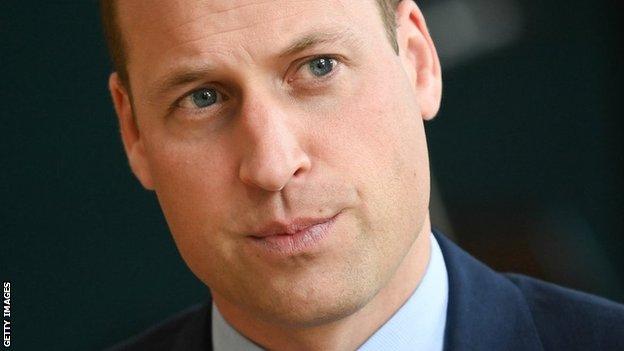
The Duke of Cambridge, who is also the president of the Football Association, has praised those who have spoken out and called for an end to the "despicable" abuse.
Writing on Twitter, Prince William also cited the need for social media companies to raise their game.
"We all have a responsibility to create an environment where such abuse is not tolerated, and those who choose to spread hate and division are held accountable for their actions. That responsibility extends to the platforms where so much of this activity now takes place," he said.
The Professional Footballers' Association, which represents players, has asked the tech giants to prevent users from being able to send explicitly racist terms and emojis. "While racist abuse is allowed to continue on each platform, we can only conclude that this is a choice by the companies running the social networks," it said.
Putting such criticism to the platforms is no easy task. We asked for an interview with Twitter on this subject back in 2019. We are still waiting for one.
Our request last week for an interview with Facebook - the owner of Instagram - was met with a short statement saying: "There is no place for racism on Instagram and we are committed to removing it when we find it. We know there is more to do and we will continue to work closely with clubs, players and football authorities to investigate instances of discrimination and collectively tackle this issue."
Twitter too issued a statement: "Racist behaviour has no place on our service and when we identify accounts that violate any of the Twitter Rules, we take enforcement action.
"We have proactively engaged and continue to collaborate with our valued partners in football to identify ways to tackle this issue collectively and will continue to play our part in curbing this unacceptable behaviour - both online and offline."
New legislation
The government meanwhile has vowed to press on with plans for "groundbreaking" new online harms legislation later this year to make tech companies legally responsible for the online safety of their users, and make them accountable to a regulator - Ofcom - over abusive content.
Racist messages would need to be removed "without delay". The proposals include the threat of massive fines of up to 10% of global turnover if the companies fail to meet their obligations, and there could even be criminal sanctions for senior executives.
Behind the scenes, I am told that while football authorities were encouraged by the recent meeting that Culture Secretary Oliver Dowden hosted with players to discuss online abuse, there is concern at how long it is taking to introduce new laws considered long overdue, and fears they may be watered down if the hugely powerful, US-based tech companies have their way and threaten to invest elsewhere.
But according to Kick It Out chief executive Sanjay Bhandari, the legislation - along with the promise of more regulation in the US from President Joe Biden - are grounds for optimism.
"The cavalry is on the way," the head of the anti-discrimination body told the BBC.
"That's the hope on the horizon, but that may not come quickly enough so there's things we need social media to do right now. The behavioural, cultural problems will take longer to solve. It's the technology problem we can do more quickly and all of the answers sit with Twitter and Facebook. Technology has been massively unregulated for 25 years and its time we closed that loophole."
Frustrations
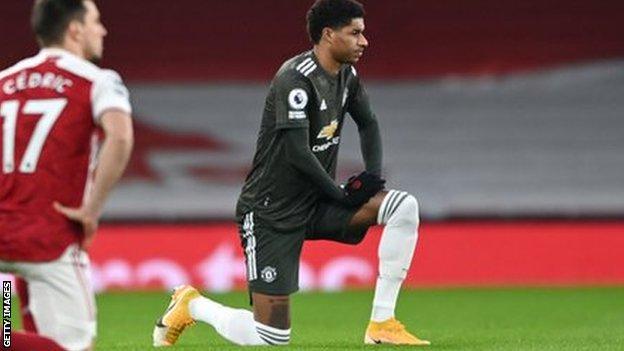
Some at the Premier League - which launched a dedicated, 'rapid-response' reporting system for players last year - say the social media platforms have improved in recent years, but not enough. There has been success with the removal of posts but officials want more effort to assist the authorities to find perpetrators so they can be banned by clubs (if they are a fan) or even prosecuted.
While there have been some successful prosecutions - an Irish teenager is due to be sentenced on Wednesday for sending racist abuse to former Arsenal and England striker Ian Wright - these are few and far between when the sheer scale of the abuse is considered.
One insider said league officials felt hampered by what they called impregnable and unresponsive tech companies using privacy, freedom of speech and the sheer weight of traffic as reasons for not handing over information that would help identify offenders. The fear is that the police - without the resources to pursue every possible crime - only intervene in the most serious cases, and abusers know they face little risk of sanctions. Court orders need to be obtained to force the platform to co-operate, evidence has to be gathered, and often offenders are overseas in different jurisdictions.
Another challenge is persuading players to take legal action, which can often seem a daunting prospect.
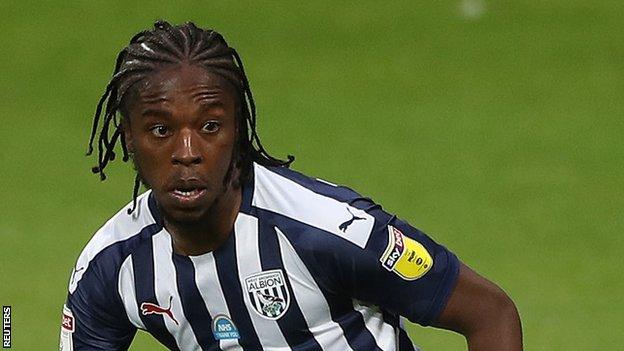
Big-tech's defence
While admitting there is "more to do", Facebook does point to the fact that it is working with Kick It Out on a fans' education and reporting initiative, and has built tools designed to prevent unwanted contact on Instagram. It has also tripled the size of its safety team to 35,000 people, claiming it proactively took action on tens of million of pieces of hate speech last year. But considering the vast wealth of these companies, many believe more should be invested.
The tech companies argue that tackling this problem is not as straightforward as many assume. They have other areas of concern that must also be monitored across their vast, unregulated platforms; from suspected terrorism and paedophilia to the spread of misinformation.
Simply blocking certain discriminatory words or emojis from being used in the first place is problematic, because these can also be used in a non-offensive context, and across global platforms can have different meanings in different communities or territories. The companies can block devices for repeat offenders, but that person can then just use a different device.
Many are now calling for an end to the anonymity that provides a shield to many abusers with a mandatory verification process that means users must give passport details for instance before opening an account. Given the mistrust over social media platforms' use of personal data however, there are fears that this could pose a threat to activists, whistleblowers and persecuted minorities who need to protect their identity online.
Many also point out that in recent years, racially offensive comments have been published on social media by fully verified accounts.
Could football do more?
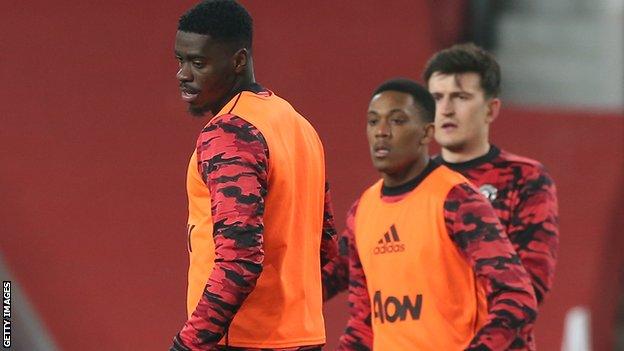
There are also those who believe that the time has come for football's authorities and clubs to invest more, and take the burden of reporting away from the players.
"The problem is that the systems that they've got in place require a player to receive and then report the abuse themselves, and by that point the damage has already been done," according to Jonathan Hirshler, the CEO of Signify, a data science company that uses artificial intelligence to uncover the identities of abusers.
"The technology is there, using AI and open source data, to unmask vile and prolific abusers.
"It's also important that football moves from reactive to proactive, to pick up abuse before the players have to, and package evidence in a way that the social platforms and authorities have little choice but to act on. So we need a new approach, working constructively with the platforms, to ensure that abusers have nowhere to hide."
There is no time to waste. During just the final six weeks of last season, a joint PFA and Signify study identified more than 3,000 explicitly abusive messages aimed at Premier League players, 56% of which were racist. Of the players surveyed, 43% said they had experienced targeted racist abuse.
Football has become a lightning-rod for a wider, societal issue. The scale of the challenge facing the sport is significant, and seems to be getting worse. Finding a solution however, is proving far from simple.





















